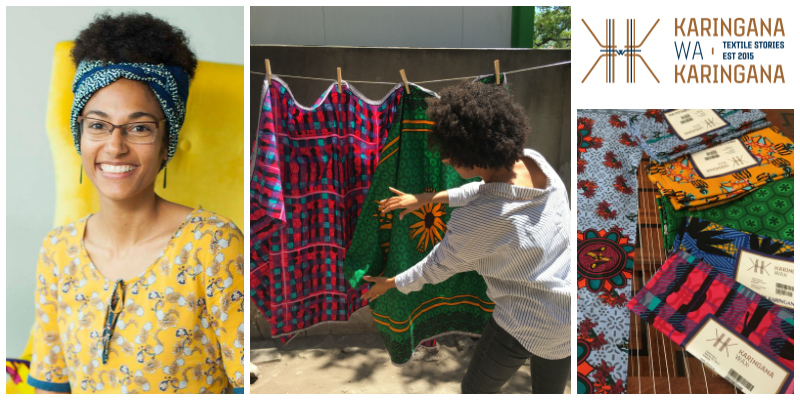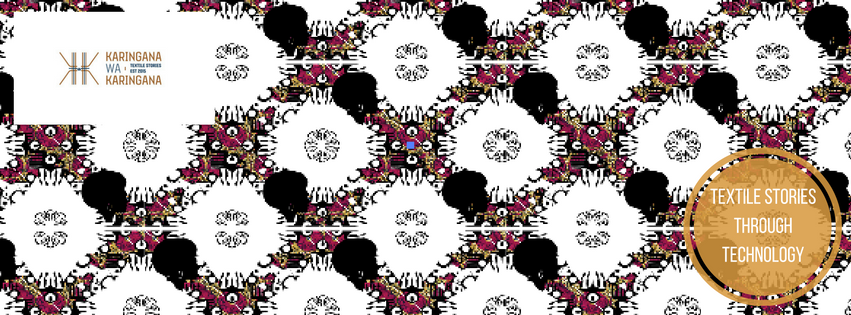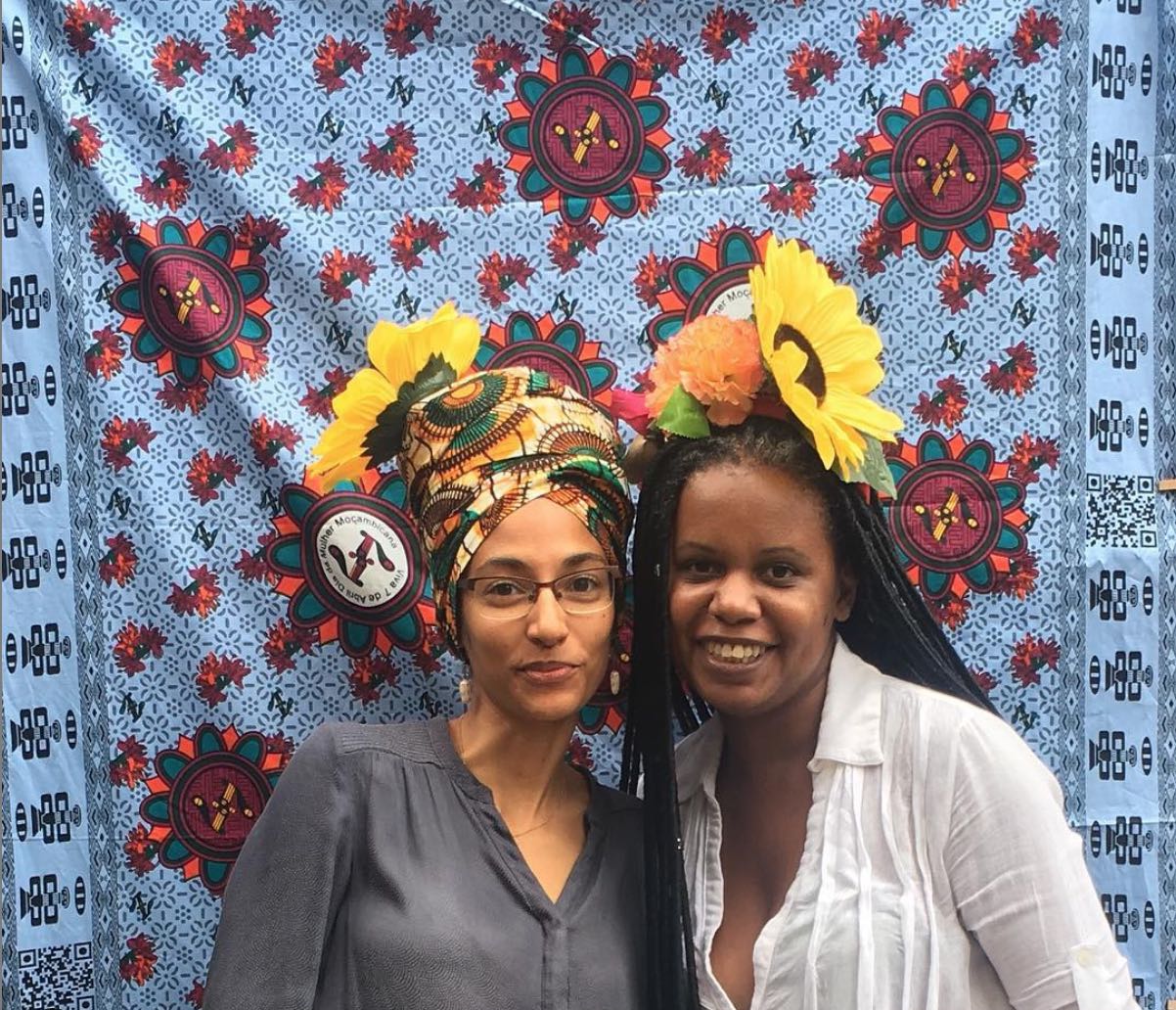Mozambique is famous for its Capulana, but one company is taking this unique textile to whole new design levels. Karingana Wa Karingana, co-founded by Djamila Machava De Sousa and Wacy Zacarias, are building a powerhouse brand that combines traditional design and cultural values presented in a modern context.
LoA talked all things capulana with Djamila recently in Maputo and found out more about her aspirations for the business and brand going forward.
What does your company do?
At Karingana we do customized print design for clients that want to tell their story or share other stories with the world. We have our Capulana line (known also as African Fabric, Ankara, Kitenge, etc). We produce hand dyed fabrics in-house. We also do textile consultancies for other designers offering African trends forecasting, advice on the types of fabrics and prints to use, or the best print method for their project.
“Our prints tell stories in a visual way as our ancestors have been doing by weaving, dying, embroidering, and painting for so many centuries.”
— Djamila Machava De Sousa (L) & Wacy Zacarias (R)
What inspired you to start your company?
I studied fashion and textiles in Italy and New Zealand, and when I returned to Mozambique I worked for few years as a kitchen designer before returning to fashion where I worked with Taibo Bacar. While working with Taibo we often had conversations about the industries shortcomings in our local industry and all the aspirations Taibo had in mind that couldn’t be made possible because we didn’t have the means or qualified people here. Wacy Zacarias joined us for a project in 2014 and these conversations about the industry continued. Wacy and I connected instantly because she understood me perfectly regarding textiles. She came from a sustainable fashion and textile print design background and had done research; she had the same questions as I did. In 2015, we decided that we needed to fill the gap in a market where you had so many fashion designers, tailors and seamstress and no textile companies. Everyone was working with capulanas but you never knew who would pick the same capulana as the other. We wanted to deliver a personalized service for the designers to express their own ideas through our prints and offer them the materials more suitable for their work, which capulana was not in many cases.
Why should anyone use your service or product?
I think that at Karingana we have a personal touch and a special combination of tradition and cultural values applied to a modern context. Our prints tell stories in a visual way as our ancestors have been doing by weaving, dying, embroidering, and painting for so many centuries. We create meaningful and impactful prints that can inform our client’s products, image and online presence.
Recently we launched our "capulanas" (also called in other parts as Ankara, Kitenge, African fabric), these are the first "capulanas" designed in Mozambique after the textile factories closed down in the 80's. We want to contribute to society, the value of African design and culture as something unique with the same standard as any other form or design in other parts of the world.
“I think that at Karingana we have a personal touch and a special combination of tradition and cultural values applied to a modern context.”
Tell us a little about your team
Wacy Zacarias and I founded the company, for few years we were the only ones working on this project. Now we are 3 women working full time. Marlene Magaia is a young lady that just started her degree in business administration and she helps us with administration and day-to-day work. Wacy is a designer, visionary and coordinates with the creative department and PR while I am more “hands on and rationale , so I deal with production and liaise with the clients. Together, Wacy and I participate in the creative and strategic processes of the business, brainstorming together and then each executes the different tasks.
We have also been collaborating long distance with Bruna Fondo, who did business administration but has a piercing eye for fashion. She helps us with research, marketing and communication of the brand. David Leonardo, a dynamic young man, just started with us and he will be our sales representative.
Share a little about your entrepreneurial journey. And, do you come from an entrepreneurial background?
One of my mum’s sisters has been in different areas of fashion and beauty for many years. My mum also started her journey in the agricultural sector a few years ago. My first experience with business was in high school when I started a bijou brand with 4 other friends. We started selling at fairs and were one of the first to do that type of work then. As we moved to University each travelled to different parts of the world and we stopped the business. After that I had one or two small entrepreneurial projects before I started with Karingana wa Karingana.
In the first year of business we did a lot of brainstorming, studied the market and organized a business model. Since then we have been working hard to implement the million ideas we have and to adapt to a very unstable and mutant market. Many things in line with global trends have been harder to implement in Mozambique because people are not ready and the ecosystem is deficient.
Along the way we had to take a few steps back and rethink how to propose ideas to suit the local market. For example, we initially offered the service of printing customized designs in different materials. But because we do not produce textiles nor have companies printing textiles we had to import from South Africa, which made the prices very high for the local clients. Now with the launching of capulanas we are getting more people to see how our prints translate to textiles.
We had the opportunity to work with some companies from Mozambique as well as International companies for custom print designs and it has been a great experience. We get to tell their stories through our perspective and style and the learning that comes from that creative process also informs us on how we operate other aspects of the business. I think there are many opportunities and potential in Mozambique but there is a lot of work to be done to make a functioning ecosystem work in order for the creative companies to strive.
“We want to contribute to society, the value of African design and culture as something unique with the same standard as any other form or design in other parts of the world.”
What are your future plans and aspirations for your company?
I would love to tell more textile stories, to have our own textile studio so we can explore other techniques, offer more variety to our clients, and to do more collaborations with designers from other fields that use prints in their work.
What gives you the most satisfaction being an entrepreneur?
Knowing that despite all the uncertainties along this path I can create a positive impact around me and that I can influence the creative industry in Mozambique to make it grow and improve.
What's the biggest piece of advice you can give to other women looking to start-up?
Prepare yourself mentally, emotionally and spiritually before going on the entrepreneurial journey. That way you’ll face your challenges better prepared. Clarity of mind and energy, I find are the key elements to great achievements.
Contact or follow Karingana Wa Karingana
FACEBOOK | TWITTER | INSTAGRAM | PINTEREST | YOUTUBE | EMAIL info@karinganawakaringana.com
Why LoA loves it….
Businesses and brands that go the distance tend to share something in common. They are driven by founders who are passionate about what they do, but who importantly understand how to deliver a unique and quality customer experience. In Mozambique, Djamila Machava De Sousa is a great example of a woman entrepreneur who is taking her inspiration and raw material from something that is intrinsic to the country, but who is making it her own through both a strong aesthetic and a good grasp of market dynamics. It has been wonderful to see Karingana wa Karingana go from strength to strength over the past few years, and to now see it poised to move to the next brand building level. Definitely a company with a bright future ahead of it. --- Melanie Hawken, founder and ceo of Lionesses of Africa









